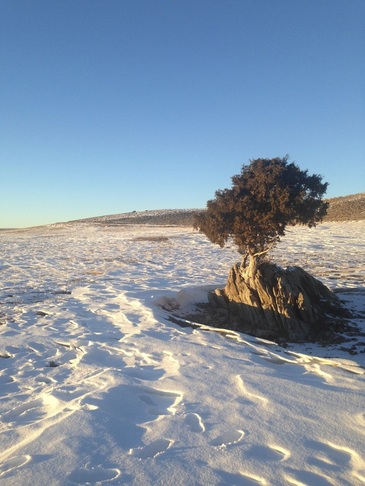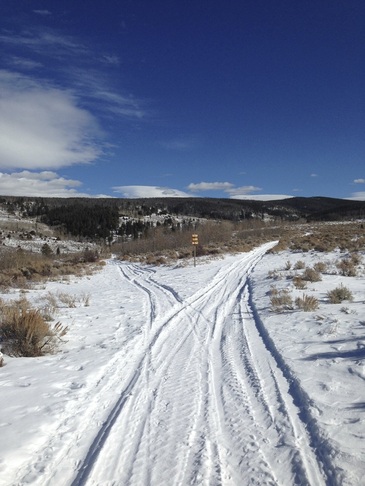|
Did you know that January is named for Janus, the Roman god of doors? I didn't know that until yesterday. I was fortunate enough this year to spend Janus' month at the Brush Creek Arts Foundation in Wyoming, a place where sunsets look like this over white-blue snow: And trees grow out of rocks: And the clouds are weird and there is space enough to think, and decisions clarify themselves: I was working on a few different projects, but one main piece carried me through the month. I worked on it very easily. Consistently, assiduously, but easily. I composed a certain amount every morning, and then--and this is the part you don't hear about often enough--I insisted upon being done, and feeling okay about being done. I wrote one page of notes, and then I closed the notebook. The next day I wrote another page of notes. I did this every day. Always one page. No more.
Why? Well, let's see: here are a couple of links about the Japanese author Haruki Murakami and his lifestyle and work routines. In the second article he starts by talking about talent for a while. The concept of "talent" is as useless as it is dangerous. It has killed a lot of artists. Let's remember that it's just a concept, that it is theoretical, that it is not measurable and that its actual existence in the world cannot be proved; let's ignore that talk. He goes on to talk about focus. I don't want to talk about that, either. We hear these two things valorized a lot, and we often praise those people we see as genius-people for possessing them. What are we ignoring? What else does the work require? Murakami's third topic, for me, is where it gets good: endurance. There's something I can believe in. You just have to keep doing something, and you have to have the fortitude, the stamina, the level of obsessiveness, or the simple stubbornness to just not stop. We should praise people less often for their "talent," whatever that is, and more often for keeping after it. There's more, though. In that first article Murakami talks about repetition. He gets up at 4, he writes, he runs, he reads, he goes to bed. And he does that every day. "The repetition itself becomes the important thing; it’s a form of mesmerism. I mesmerize myself to reach a deeper state of mind." The repetition itself becomes the important thing. There is tremendous liberation in accepting a creative routine. It's taken me this long to really learn this. If you're remaking the world every single day, sitting down at the desk or the piano and saying, "…ok. What should I work on?" -- this takes a lot of energy, and it prevents you from sinking to a deeper, easier, more creative mind-state. The work is always harder if you're operating on the surface up there. You have to make some of those decisions in advance for yourself, and stick to them--not because you owe anything specific to the world, posterity, the tradition, or your own "talent," but because it's easier that way. Working this way for just one month, I did some of the easiest, deepest, most fun and rewarding composing I've done my whole life. If it isn't obvious: knowing when to stop, and then choosing to do so, is a crucial aspect of endurance. One more thing: "When I start to write, I don't have any plan at all. I just wait for the story to come. I don't choose what kind of story it is or what's going to happen. I just wait." -- guess who. I did that, too. I started writing music with no plan. The last day of the residency, I wrote a page of notes with a double bar at the end. The piece was over. I'm not going to say that everyone should write pieces this way, but I sure as hell loved it. No plan, no responsibility to any extramusical schemes or musical materials. Just some music, every morning. I got up in the morning and wrote what I wanted, and then the next morning I did that again. It was important for me to accept the first idea I had. When you're improvising a scene with another actor, the famous rule states, you can't say "no" to any question they throw your way. You say "yes, and." You take what they give you and build on it. Saying "no" stops the flow. For years I've made awful faces and mimed vomiting whenever a composer mentions the "muse," but in this case it was useful for me to think of writing this piece as doing a scene with the muse. We were on stage; people were watching. When she tossed me an idea, I couldn't say no. I felt, for this piece anyway, that to reject any idea was to reject all of them, was to reject music itself, was to meet an immediate dead end. I had to say yes to everything. I don't care how "good" the piece is. Writing it was joyful and buoyant. I'll bet you that carries, when the music is heard. It's a long piece. I won't say more about it right now. Ok, one more thing, one more thing. "[Murakami] has an unusual attitude to endings: he doesn't really care for any kind of conclusion. The journey is more important than the destination." Comments are closed.
|
A Selection• Gone Walkabout
• Migration • Music as Drama • Crossroads II • 10 Best of 2014 • January: Wyoming and the Open • February: New Mexico and the Holes • Coming Up • Notes on The Accounts • Crossroad Blues • Labyrinths Archives
October 2020
|




 RSS Feed
RSS Feed